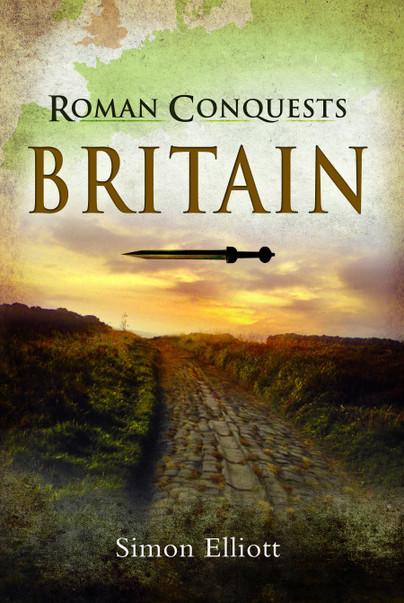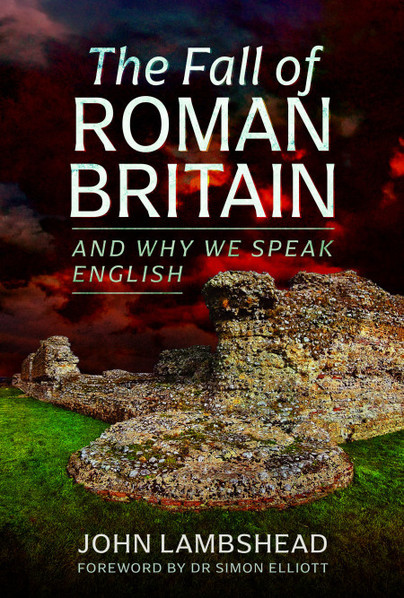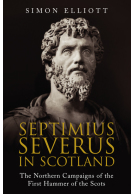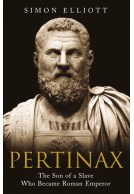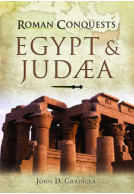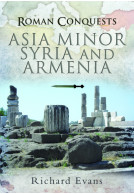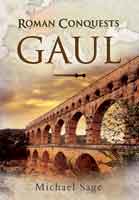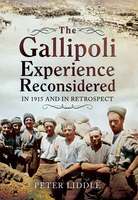Roman Conquests: Britain (Hardback)
Imprint: Pen & Sword Military
Series: Roman Conquests
Pages: 240
Illustrations: 12 colour plates
ISBN: 9781526765680
Published: 23rd July 2021
Review!
Video review by Dr Alexander Clarke
(click here for international delivery rates)
Order within the next 3 hours, 2 minutes to get your order processed the next working day!
Need a currency converter? Check XE.com for live rates
| Other formats available - Buy the Hardback and get the eBook for £1.99! | Price |
|---|---|
| Roman Conquests: Britain ePub (28.2 MB) Add to Basket | £6.99 |
The Roman Conquests series seeks to explain when and how the Romans were able to conquer a vast empire stretching from the foothills of the Scottish Highlands to the Sahara Desert, from the Atlantic to the Persian Gulf. How did their armies adapt to and overcome the challenges of widely varied enemies and terrain?
In this volume, Dr Simon Elliott draws on the latest research and archaeological evidence to present a new narrative of the conquest (never completed) of Britain. From Julius Caesar’s initial incursions in 55 and 54 BC, through the Claudian invasion of 43 AD and the campaigns of expansion and pacification thereafter, he analyses the Roman army in action. The weapons, equipment, organization, leadership, strategy and tactics of the legions and their British foes are described and analysed. The ferocity of the resistance was such that the island was never wholly subdued and required a disproportionate military presence for the duration of its time as a Roman province.
You have battles and strategy, backed up by the main people, equipment and organisation on both sides. There's even room to fit in some detail on the infamous legio IX Hispana which disappeared in the early 2nd century. With photos of equipment ad locations, you get a compact and lively guide to the Roman occupation.
The Armourer June 2022
As featured in
VaeVictis
The British Isles became one of the major obstacles for Roman expansion in the late BC/early AD. But other than the stories involving bodacious Boudicca, the British chieftain who had the temerity to rebel against the Romans for raping her daughters or about Hadrian’s Wall, built to keep those pesky northern Picts at bay, I knew little about that period. Enter Simon Elliot’s Roman Conquests: Britain (Pen and Sword, 2021;) Elliot covers all Roman activities on the Isles from Julius Caesar’s two temporary incursions in 54-55 BC through the last major campaign of Theodosius in 367 AD.
John D. Burtt
Rather than start with Caesar’s initial incursion, Elliot first gives us a good overview of 1) the Roman military machine that would cross Oceanus (aka The Channel), their organization, weapons and armor and 2) the tribal situation in Britain at the time of the initial invasion, as well as some geography notes. All this puts the conquest in the context of the period. He then adds a lot of information about the commanders/emperors who made the many incursions, pointing out the political (and monetary) rewards that conquest brings.
The various campaigns are then discussed in detail, giving the strength of the invasion force, from Caesar’s initial two legions up to Severus’s 50,000 troops to push into what is now Scotland in 209 AD. Elliott discusses where they landed, what battles they fought, who they beat and who they made deals with. He uses the most recent archeology and historical writings, as well as those period sources available; he also talks about the “where did it take place” controversies that arise when there are divergent views. Elliot gives each their place and adds his own supposition as well. For British readers, most of these discussions will be meaningful as he places them via modern placenames. However, non-British readers will be at a loss, as there are few maps to pinpoint where these battles and river crossings et al occur. Of course, if there is an argument about “where,” having a map probably wasn’t appropriate. Just saying.
He adds some other historical discussions about what was happening in the Roman empire, even when it didn’t affect Britain. For example, there was no Roman follow-up to Caesar’s two invasions for almost 100 years – Rome’s civil war and Augustus Caesar’s attentions elsewhere accounted for the Isles being left alone. Again, it’s a nice addition to put the British story in the context of the whole Empire,
Elliot ends his book with a discussion of the impact the Roman conquests had on the island. For example, most of the main roadways still follow the Roman-built roads; of the political effects such as Scotland holding on to its independence just as hard through the years as they did against the best that Rome could throw at them. It’s a nice addition to the overall discussion.
Elliot has added a timeline on the conquests starting from the advent of the Roman Republic in 509 BC through 476 AD when the Western Roman Empire collapsed. This, added to a good bibliography to help in further studies, makes for an excellent focused look at Rome’s history in the British Isles.
This book is a good stand alone read and a valuable jumping off point for those who want more. We highly recommend it.
Clash of Steel
Read the full review here
Essential reading for anyone with even a minor interest in the Roman invasion of Britain. Superlative history.
Books Monthly
To encompass such an immense topic successfully is, in itself an astonishing achievement, requiring exceptional organisation, enormous research – not to mention considerable writing skill...One of the great things about a book by Simon Elliott is that you find yourself completely immersed in the subject matter.
Dodging Arrows… a History Writer's Blog
Simon Elliott has written what must now surely be the ‘go-to’ book on the Roman conquest of Britain.
Read the full review here
In this book, the author takes us through this period, step-by-step, making sure we the readers are up to date on what Britain and Rome were like at the time, as well as how both parties interacted with Europe in general.
Instagram, @natalieisahistorybuff
Read the full review here
I was blown away by the detail in this book. You're treated to a whole lot of military history, including lots of Latin words, weapons and battle formations, which really helped me visualise events like the famous battle between Boudicca and the Romans. I learned a lot more about the extent of resistance to Roman rule too, which I hadn't really appreciated before. And I was so pleased to see a lot of modern research quoted, including references to recent archaeological evidence, which is always great in a history book like this.
Love British History
Read the full review here
The author Simon Elliott gives what seems to me, a well balanced and informed book, he explains a wide range of information and subjects such as politics, government, organisation, weaponry, armies and logistics. It rightly seems Simon deserves our respect as a leading award-winning broadcasting historian/archaeologist, and I loved the fact that some of the pictures and models belonged to the author himself. Talking of the pictures in this book there are some great photos, drawings, models in the book that really add to the book and the writing. There is also a great timeline and bibliography at the back of the book, and the timeline gives the reader a good basis of knowledge to use through the book or to go on for further reading.
UK Historian
This book Roman Conquests: Britain written by Dr Simon Elliott is a great book, full of fascinating details and information covering the Romans conquest of Britain. A very informed book, covers a wide range of time in an easy and understandable way, this book is certainly one I would recommend for the beginner to the subject or the person who already knows quite a bit. So much so that this has spurred me on more to get back into reading more about the Roman Empire.
Read the full review here
Roman Conquests: Britain is a detailed, fascinating look into the conquest of Britain by the massive Roman war machine. Impressive research combines with an engaging narrative to make this an eminently readable book.
History... The Interesting Bits
Read the full review here
Click here to watch
Video review by Dr Alexander Clarke
Rating: 5 out of 5 stars
NetGalley, Anna Maria Giacomasso
Informative, entertaining and well researched.
It's an engrossing reads that can be appreciated by those who want to learn something about Roman history and those who want to learn something new.
Highly recommended.
Rating: 5 out of 5 stars
NetGalley, Dawn Lewis
Having read some of Dr Simon Elliott's previous work, I wasn't surprised by this book. "Roman Conquests: Britain" entertains as much as it informs. It's written in a way that doesn't over-complicate things, making it easy to read for even the most novice reader of Roman history. Drawing on the latest archaeological evidence and research, this is fascinating reading. I don't often (never?!) mention covers, but this one is stunning!
Certain authors inspire confidence that their work will be to a standard and Dr Elliott has confirmed his reputation with this book. Detailed but very readable, this should be a foundation of any interest in the subject.
Michael McCarthy
Michael McCarthy. Battlefield Guide
About Simon Elliott
Dr Simon Elliott is an award winning and best selling archaeologist, historian and broadcaster with a PhD in Classics and Archaeology from the University of Kent where he is now an Honorary Research Fellow. He has an MA in Archaeology from UCL and an MA in War Studies from KCL. Simon is widely published with numerous works in print on various themes relating to the ancient world, with a particular focus on the Roman military, and he makes frequent appearances on TV as a Roman expert. Simon lectures widely to universities, local history societies and archaeological groups, is co-Director of a Roman villa excavation, a Trustee of the Council for British Archaeology and an Ambassador for Museum of London Archaeology. He is also a Guide Lecturer for Andante Travels and President of the Society of Ancients.
The Fall of Roman Britain and Why We Speak English (Hardback)
The end of empire in the island of Great Britain was both more abrupt and more complete than in any of the other European Roman provinces. When the fog clears and Britain re-enters the historical record, it is, unlike other former European provinces of the Western Empire, dominated by a new culture that speaks a language that is neither Roman nor indigenous British Brythonic and with a pagan religion that owes nothing to Romanitas or native British practices. Other ex-Roman provinces of the Western Empire in Europe showed two consistent features conspicuously absent from the lowlands of Britain:…
By John Lambshead, Simon ElliottClick here to buy both titles for £39.99







